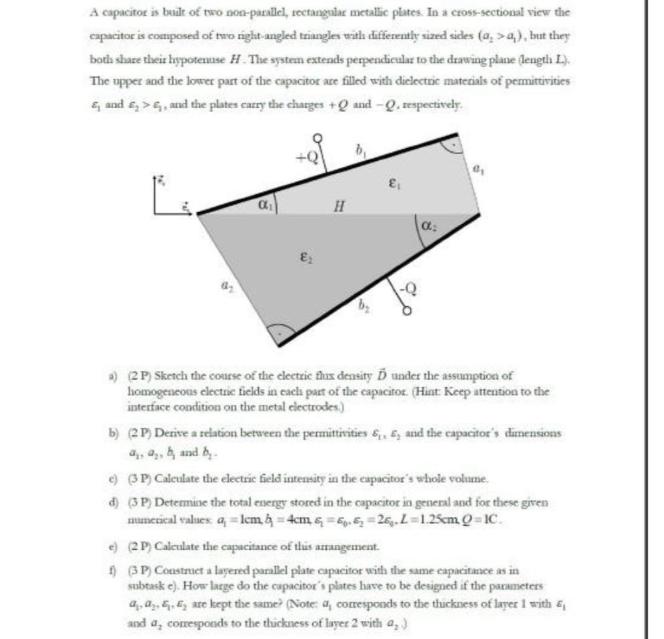Answered step by step
Verified Expert Solution
Question
1 Approved Answer
A capacitor is built of two non-parallel, rectangular metallic plates. In a cross-sectional view the capacitor is composed of two right-angled triangles with differently

A capacitor is built of two non-parallel, rectangular metallic plates. In a cross-sectional view the capacitor is composed of two right-angled triangles with differently sized sides (a,>a,), but they both share their hypotenuse H. The system extends perpendicular to the drawing plane (length L.). The upper and the lower part of the capacitor are filled with dielectric materials of permittivities & and >, and the plates carry the charges +Q and -Q, respectively. E: H b a) (2P) Sketch the course of the electric flux density D under the assumption of homogeneous electric fields in each part of the capacitor. (Hint: Keep attention to the interface condition on the metal electrodes.) b) (2P) Derive a relation between the permittivities 6, 5, and the capacitor's dimensions a, a, b, and by e) (3P) Calculate the electric field intensity in the capacitor's whole volume. d) (3P) Determine the total energy stored in the capacitor in general and for these given mumerical values alem &=4cm & = 6. & = 26. L=1.25cm 0=IC. e) (2P) Calculate the capacitance of this arrangement. f) (3P) Construct a layered parallel plate capacitor with the same capacitance as in subtask e). How large do the capacitor's plates have to be designed if the parameters a. a... are kept the same? (Note: a, corresponds to the thickness of layer 1 with and a, corresponds to the thickness of layer 2 with 4,)
Step by Step Solution
There are 3 Steps involved in it
Step: 1
a Electric Flux Density For a dielectric material the relationship between electric field E electric ...
Get Instant Access to Expert-Tailored Solutions
See step-by-step solutions with expert insights and AI powered tools for academic success
Step: 2

Step: 3

Ace Your Homework with AI
Get the answers you need in no time with our AI-driven, step-by-step assistance
Get Started


